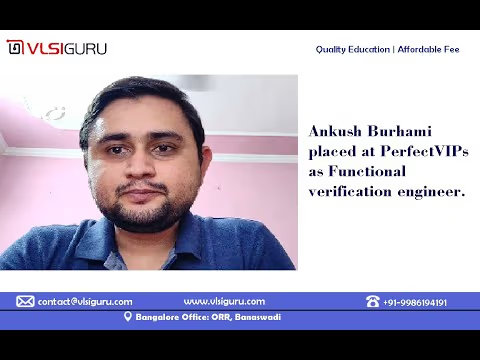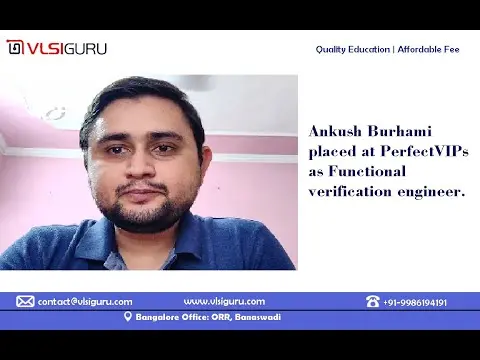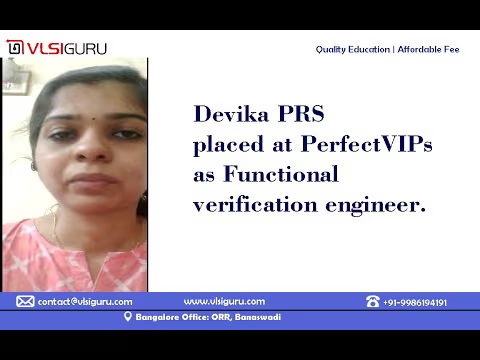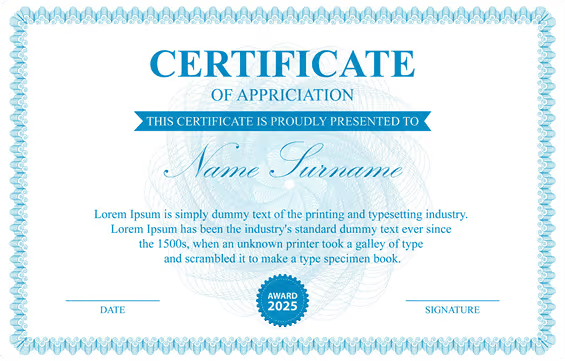9-week course provides participants with in-depth exposure to UVM constructs and complex TB development using UVM.
Next Batch
1-1 Dedicated Mentor Support
24/7 Tool Access
Multiple Mock Interviews
Industry Standard Projects
Support with Resume Update
UVM Course Overview
UVM training is a 9 weeks course provides participants with in depth exposure to all the UVM constructs using practical use case examples. Course includes 15+ assignments covering all the constructs in depth.
Course also includes multiple hands on projects based on APB, AHB test bench development. Also includes TB development for AHB interconnect model.
- AHB Interconnect verification project used as reference design to learn UVM & OVM
- AHB Interconnect will be verified from scratch while teaching all aspects of UVM
- What is UVM? Need for a methodology?
- How UVM evolved?
- OVM, AVM, RVM, NVM, eRM
- UVM class library
- Classification of base classes in various categories
- OOP basics
- Encapsulation
- Inheritance
- Polymorphism
- Parameterized classes
- Parameterized macros
- Static properties and static methods
- Abstract classes
- Pure virtual methods
- How above aspect correlates with UVM implementation.
- UVM Class Library, Macros, Utilities
- Detailed overview of important UVM base classes, Macros and Utility classes.
- UVM TB Architecture
- Setting up a UVM based testbench for APB protocol from scratch.
- Significance of uvm_root in UVM based testbenches.
- run_test, how it starts whole TB flow.
- Command line processor
- Reporting classes
- Uvm_report_object
- Uvm_report_handler
- Uvm_report_server
- Detailed examples on use of methods in these classes.
- Objections
- UVM Factory
- Configuration DB, Resource DB
- Detailed usage of both data bases.
- How config_db is related to resource_db?
- Using config_db to change the testbench architecture.
- TLM1.0
- Push
- Pull
- FIFO
- Analysis
- Complex example on AHB to AXI transaction conversion.
- Simulation Phases
- UVM common phases
- Scheduled phases
- Sequences, Sequencers
- Default sequence
- p_sequencer
- m_sequencer
- Test case development
- Different styles of mapping testcase to sequence
- Using default sequence and scheduled phases
- Using sequence start method
- Configuring TB Environment
- Advanced aspects of developing a highly configurable test bench environment.
- Concept of knobs of test case scenario generation
- Using top level parameters to control the overall TB architecture
- AHB Protocol and AHB UVC development
- Coding from scratch with detailed explanation of each aspect.
- Setting up a highly configurable UVC to meet different TB requirements.
- Different testbench component coding
- Monitor
- Coverage
- Scoreboard
- Checkers
- Assertions
- Different styles of sequence development
- uvm_do
- start_item and finish_item
- Using existing sequences
- Sequence library
- Creating complex test cases using sequence library
- Virtual Sequencer, Virtual sequences
- Different types of sequences used in test benches
- Reset sequence
- Power up sequence
- Interrupt handling sequence
- DMA handling sequence
- FSM verification sequence
- Layered sequence development
- How to create multiple layers of sequences
- Creating complex test cases using layered sequences
- Virtual sequence library
- Creating test cases using virtual sequence library
- Synchronization classes
- uvm_barrier
- uvm_event
- Container classes
- Policy classes
- uvm_printer
- uvm_recorder
- uvm_packer
- uvm_comparer
- Comparators
- In order comparator
- Algorithmic comparator
- TLM2.0
- Blocking transport
- Non-blocking transport
- Register Layer development for USB2.0 core
- Note: Doesn't involve USB2.0 core verification
- Connecting multiple UVCs
- How to setup a complex testbench environment with multiple UVC's connected.
- uvm_heartbeat
- How to check test bench status using heartbeat
- uvm_report_catcher
- How to handle error testcases using report catcher
- Phase jumping
- uvm_domain

Key Features
Who All Can Attend This UVM Course?
This UVM functional verification course is ideal for fresh engineering graduates and entry-level professionals seeking to build a strong foundation in VLSI verification.Pre-requisites To Take UVM Advanced Course With Multiple Projects
- Basic digital logic design concepts.
- Familiarity with System verilog.
- Elementary understanding of programming concepts.
High Demand for UVM Advanced Course With Multiple Projects
Know about the Growing VLSI industry
Responsible for developing and executing verification plans for SoC/ASIC designs using UVM methodology. Works on simulation, debugging, writing testbenches, and ensuring design quality before tape-out.
Demand for Functional Verification Engineers is growing steadily with a 20–25% year-on-year increase due to the VLSI industry's expansion in India.
₹4 LPA
₹7 LPA
₹10 LPA
₹13 LPA

Mode of Training
Next Batch
1-1 Dedicated Mentor Support
24/7 Tool Access
Multiple Mock Interviews
Industry Standard Projects
Support with Resume Update

- Learn in real-time with instructor-led sessions
- Flexible access from anywhere
- Recorded sessions available for revision
- Training on industry-standard tools
- Get certification after completion

- Self-paced learning as per your flexibility
- Industry-aligned learning modules
- Certification after course completion
- Access to structured video lessons and materials
- Track your progress step by step
- Access to learning materials for more than 1.5 years
Attending a UVM course provides a strong foundation in functional verification, which is one of the most in-demand skills in the VLSI industry today. This 9-week UVM training equips you with practical knowledge of UVM constructs, helping you build robust testbenches and understand advanced verification techniques used in real-world chip design projects.
You'll gain hands-on experience by working on industry-standard protocols like APB and AHB, including complete testbench development for complex systems like the AHB interconnect model. With 15+ assignments and guided projects, you'll become confident in building reusable, scalable, and modular test environments using UVM.
The course is designed to bridge the gap between theoretical learning and practical application, making you job-ready for roles like Verification Engineer or UVM Developer. Whether you're a student, fresher, or working professional aiming to switch domains, this training will boost your career prospects and increase your chances of securing opportunities in top semiconductor companies.
Career Path
Learning Path

At VLSIGuru, we believe that education should lead to meaningful employment. Our training programs are designed not just to impart technical excellence, but also to bridge the gap between academic learning and industry demands. With a strong network of hiring partners and a proven track record, we ensure that our students are career-ready.
Placement Highlights
Projects
By working on below projects, student will get familiar with:
- AHB and APB standard protocols
- Industry standard simulation tools like Questasim & VCS
- Develop debug expertise
- UVM based TB development for complex Designs
- Industry-aligned curriculum
- Hands-on projects and case studies
- Communication skills
- Resume building and interview preparation
- Technical and HR mock sessions
- Aptitude and domain-specific test series
- Regular drives and exclusive hiring events with partner companies
- Resume building and interview preparation

At VLSIGURU, we provide industry-focused VLSI training and guidance that helps students and professionals build strong technical skills and succeed in their careers. Our programs are designed to be practical, flexible, and aligned with current industry requirements.
Student Reviews




Frequently Asked Questions
- Course presentations for all topics
- Session notes
- Lab documents with detailed steps
- User guides
- Expertise on SystemVerilog Language
- Exposure to Testbench coding using SystemVerilog
- Each aspect of course is supported by lot of practical examples
- AHB Interconnect is reference design from Session#1 towards implementing and learning different UVM aspects
- All UVM course examples, AHB UVC, AHB Interconnect and USB2.0 Core Verification environment implemented from scratch as part of sessions
- Dedicated full day lab sessions to ensure student does complete testbench development from scratch
Each session of course is recorded, missed session videos will be shared
- Yes, You will have option to view the recorded videos of course for the sessions missed
- You will have option to repeat the course any time in next 1 year
- Yes, Course fee also includes support for doubt clarification sessions even after course completion
- You have option to mail you queries
- Option to meet in person to clarify doubts
In this course, you will master the Universal Verification Methodology (UVM), learning to develop scalable, reusable, and modular testbenches for complex digital designs. You'll also gain hands-on experience with APB and AHB protocols, verification components, and real-world projects to build deep expertise in functional verification using SystemVerilog and UVM.
The course spans 9 intensive weeks, offering a structured learning path that starts from UVM fundamentals and advances to sophisticated testbench architectures. It includes 15+ assignments, hands-on projects and practical implementation to ensure you're ready for the industry.
We offer flexible learning schedules, including weekday evening and weekend batch options, to accommodate both students and working professionals. This flexibility ensures consistent participation and learning at your convenience.
Yes, knowledge of system verilog is mandatory . The course begins with the basics and gradually builds to advanced UVM concepts. Motivated learners, especially freshers, can easily keep up with the support of experienced instructors.
Yes, this course is ideal for fresh engineering graduates, especially from ECE or related branches. It is designed to bridge the gap between academic knowledge and industry expectations, helping you build practical verification skills from the ground up.
After completing the course, you can pursue roles such as Junior Verification Engineer, Testbench Developer, Functional Verification Engineer, Verification IP Engineer. These roles are in high demand in the semiconductor industry, particularly in VLSI companies.
Yes, the demand for UVM verification professionals is soaring due to the increasing complexity of semiconductor designs. Companies need skilled engineers who can implement robust verification strategies, and UVM is the industry-standard methodology.
Freshers with strong UVM knowledge can expect a starting salary ranging from ₹4.5 LPA to ₹8 LPA, depending on their performance, academic background and company location. As you gain experience, salaries can rise rapidly in this field.
Absolutely, You will learn to design, develop and implement UVM testbenches from the ground up. The course covers everything from environment setup to testcase creation, virtual sequences, and advanced verification components.
Yes, the course goes beyond the basics to cover advanced UVM constructs like virtual sequencers, layered sequences, register model integration, configuration databases, and more. This prepares you for handling real-world verification challenges.
VLSIGURU is a trusted name in VLSI training, known for its industry-oriented approach, real-time project exposure and expert instructors with deep experience in functional verification. You also benefit from placement support and networking opportunities with alumni.
The course is taught by highly experienced industry professionals, each with 10+ years in the VLSI domain. They bring real-world experience, strong fundamentals and hands-on insight into UVM-based verification practices.
Yes, upon successful completion, you will receive a certificate from VLSIGURU which validates your practical skills and training. This certificate adds weight to your resume and enhances your chances during recruitment.
Definitely, VLSIGURU is well-regarded among VLSI recruiters and verification teams, and its certification signifies a practical, hands-on learning experience. Many of our alumni have secured roles in top semiconductor companies.
You will gain hands-on exposure to industry-standard tools like ModelSim or Questa, which are widely used in functional verification. These tools will help you compile, simulate and debug your UVM testbenches effectively.
Yes, the course includes mock interviews, real-world assignments and frequent assessments. These ensure that you're well-prepared to answer both technical and conceptual questions in interviews with confidence.
© 2025 - VLSI Guru. All rights reserved
Explore a wide range of VLSI and Embedded Systems courses to get industry-ready.
50+ industry oriented courses offered.

Explore a wide range of VLSI and Embedded Systems courses to get industry-ready.
50+ industry oriented courses offered.






